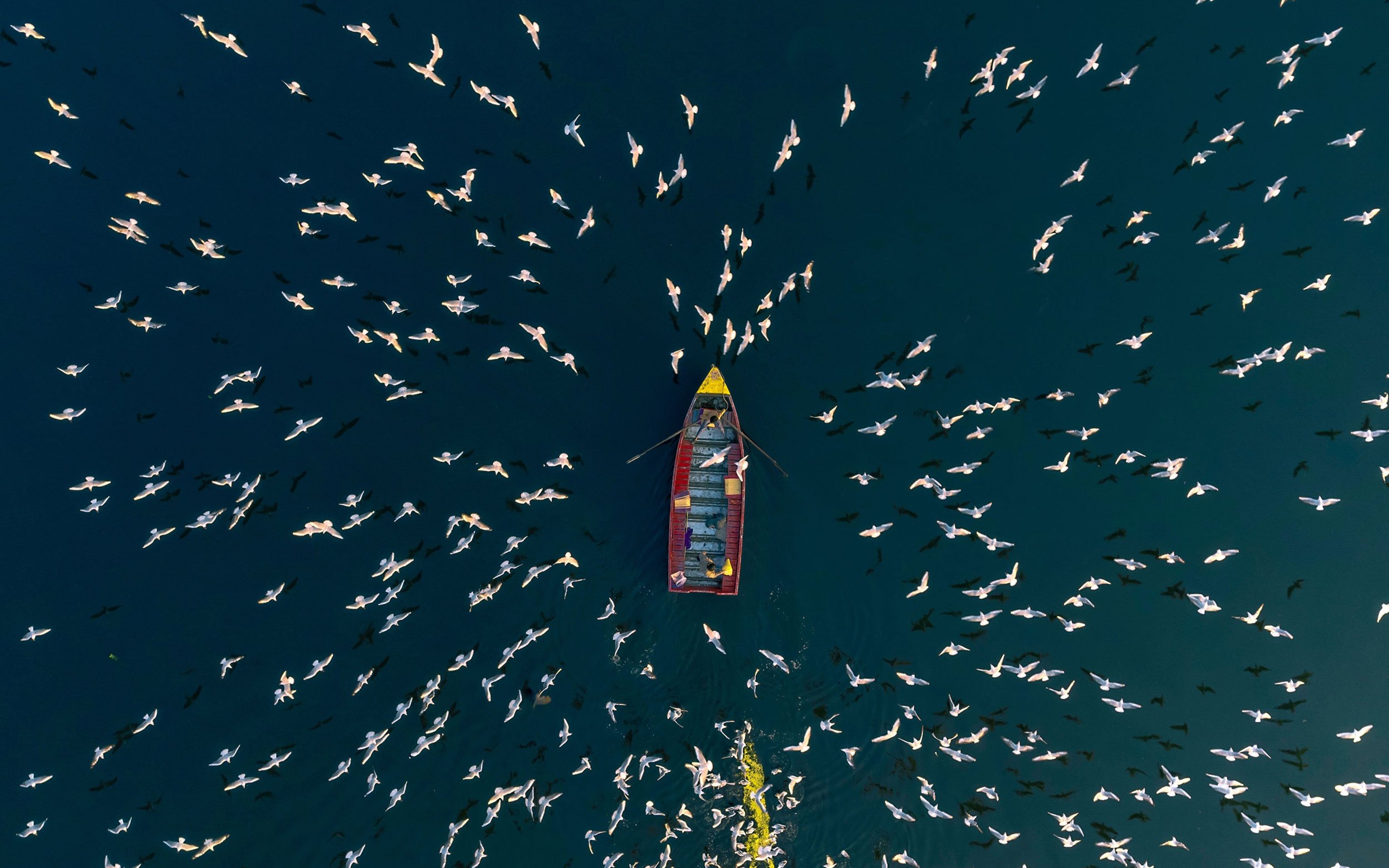Key points
The Emerging Markets Team shares insights on Q3 2024, covering the strategy's recent performance, portfolio adjustments, and market influences.

Your capital is at risk.
The immediate focus of the Emerging Markets (EM) team is the impact of the Federal Reserve starting to cut interest rates. Is this a harbinger of lower inflation or lower growth in the US economy? Also under discussion are the underweight positions in China and India. In China, the geopolitical challenges notwithstanding, there is a compelling valuation opportunity, and China remains largely the master of its domestic trajectory. This view was backed up by the recent more targeted and coordinated stimulus, which led to a bounce in markets. Our inclination is to add to existing holdings where we are more clearly through regulatory ‘rectification’. In India, we are increasingly frustrated by valuations that seem to be stretched, and we continue to hunt for decent growth companies at reasonable valuations to reduce the underweight. However, indiscriminately buying expensive shares in companies with modest long-term growth profiles seems a poor use of our clients’ money.
Longer term, investors will still be cogniscent of EM’s modest returns relative to the World and especially the US indices over the last decade or more. Let’s not forget that much of those superior returns were driven by quantitative easing, negative interest rates and yield curve control – it’s amazing what free money will do for asset prices! In contrast, most EM countries have run orthodox monetary policies and conservative fiscal policies. To anchor off the recent stock market performance is to risk fighting the last war, especially as we move from a fairly stable and predictable unipolar world to a more fluid and dynamic multi-polar one. In such an environment, there are three areas that Emerging Markets stand out against Developed Markets:
- EM countries don’t have to pick a side; they’re not ‘them’ or ‘us’. Expect them to play both sides against the middle for their own benefit.
- EM countries contain many of the resources and minerals that are needed to move to a cleaner and greener global economy.
- EM countries still contain some of the largest under-served domestic markets whose needs may well be met by local champions.
The Non-Aligned Movement (“NAM”) was born in the last Cold War. In 1961, it was created by the ideologically disparate group of Yugoslavia's President Tito, India's Prime Minister Nehru, Egypt's President Nasser, Ghana's President Nkrumah and Indonesia's President Sukarno. All five believed developing countries should not become embroiled with either NATO or the Eastern Bloc. The NAM still exists today with 120 members and held its triannual conference in Uganda in January this year; perhaps it will find a new purpose in the face of Sino-American rivalry? Even as things stand, China is South Korea’s, Brazil’s, South Africa’s and Indonesia’s number one export partner, while the US is their second. China is India’s fourth export partner, the US is its first, Vietnam’s number one export partner is the US, and China is its fourth. These countries are hedging their bets, and an Emerging Market exposure allows investors to do the same.
Near-shoring, re-shoring and environmental pressures mean that some commodities could see a step change in demand over the next decade. Who has the biggest copper reserves? Chile & Peru. Who has the biggest bauxite reserves? Guinea and Vietnam. Who has the biggest nickel reserves? Indonesia (Australia) & Brazil. Who has the biggest manganese and platinum reserves? South Africa. All Emerging or Frontier countries. Amongst these, Indonesia pursued a policy of capturing more of the value-added processing of these minerals. It banned the export of raw nickel in 2020 and has subsequently seen almost $14 billion US dollars (US$) invested in domestic smelting capacity. How long before other countries follow suit? To get a meaningful investment in the future growth areas in metals and mining requires an Emerging Market allocation.
Consumption growth has long been one of the narratives of Emerging Market investing. However, it remains striking how much further there is to go. 37 per cent of the world’s population, roughly 2.9 billion people, have yet to go on the internet. Most of these people live in Latin America, Africa and Asia. In many cases, these people are in more remote, rural locations. Perhaps the most crucial corollary for these future savers and spenders is that they have no access to a bank. In 2021 numbers, 66 per cent of the Philippines (pop. 110 million), 63 per cent of Mexico (pop. 129 million), 51 per cent of Indonesia (pop. 274 million), and 30 per cent of Brazil (pop. 213 million) were unbanked. This inhibits a substantial proportion of the population in Emerging Markets from saving, consuming and investing. Clearly, no banks will ever build branch networks to bring these people into the financial system, but innovative digital delivery might do the trick.
In decades past, perhaps many asset owners allocated to Emerging Markets as a high beta bet on global growth. For better or worse, things are now more complex. A unipolar world is now bipolar or even multipolar. As a result, financial and trade flows are shifting, which may reduce the volatility and increase asset class diversification. These increased opportunities in Emerging Markets are reflected in a broader, deeper opportunity set within the asset class. A combination of a stable top-down outlook and a plethora of great bottom-up opportunities could be looming.
Performance
The portfolio's performance was markedly skewed by what appeared to be the Chinese authorities' first attempt at a coordinated policy response. Thus far, the assorted measures have increased liquidity significantly, which is good for the stock market. However, there have only been hints that this will be backed up by the fiscal stimulus necessary to restore confidence in the economy. Without the latter, there is a danger that this rally will peter out like its recent predecessors. Nonetheless, Ping An Insurance, Midea, Haier Smart Home and Luckin Coffee, amongst others, leapt into the contributors for the quarter. In the shorter term, whether this performance continues depends on the actions of the Chinese government.
Latin American ecommerce and fintech business MercadoLibre was amongst the main contributors to performance. 2Q24 results once again beat the market expectations. Net revenue across its platform grew 42 per cent year-over-year (YoY) to US$ 5.1 billion, and net income +103 per cent YoY at US$ 531 million. In ecommerce, Gross Merchandise Value (“GMV”) grew +20 per cent YoY to US$ 12.6 billion while the number of items sold rose +29 per cent YoY to 420.9 million. On the fintech side, the Total Payment Value (“TPV”) was +36 per cent YoY at US$ 46.3 billion, with monthly active users above 50 million for the first time, which had grown to +37 per cent YoY. However, it remains the case that ecommerce and financial penetration remain low in much of Latin America, giving ample scope for growth.
Similarly, South East Asia’s gaming, ecommerce and fintech business SEA Ltd was also a strong positive contributor. Again, strong 2Q24 results were the catalyst, with revenues +22 per cent YoY and a return to profitability. On the ecommerce side, Shopee’s GMV was US$ 23.3 billion, +29 per cent YoY, while in Fintech, SeaMoney accumulated 21 million consumers and SME loan active users, up nearly 60 per cent YoY. On the gaming side (Garena), its major title, ‘Free Fire,’ maintained over 100 million Daily Active Users and was the most downloaded mobile game globally during the quarter. Fears of maturity in Free Fire look overdone, while it is anticipated that Shopee should be profitable by year end. These positives, combined with the momentum in fintech and a US$ 9.0 billion cash pile, suggest it is well placed to continue to grow strongly.
We wrote about Bank Rakyat last quarter as it was one of the leading detractors to performance. This quarter, it is one of the main contributors, highlighting the limitations of looking at performance in terms of months rather than years. What has changed? To be fair, the Bank of Indonesia front-ran the Fed and cut interest rates by 0.25 per cent in mid-September. As we highlighted last quarter, micro-loans make up almost half of Bank Rakyat’s loan book, a high proportion of which are fixed. As a result, the bank benefits from a falling interest rate environment. In the longer term, we continue to like Rakyat, which uses innovative techniques (from its own satellites to floating banks) to reach its customers, who are spread over 18,000 islands. Moreover, as noted above, roughly half of Indonesia’s 274 million inhabitants still don’t have a bank account.
Sentiment has softened towards AI recently, which has affected the share price of many of the semiconductor stocks, notably the Korean memory chip makers SK Hynix and Samsung Electronics. NVIDIA’s AI chips need similarly powerful High Bandwidth Memory (“HBM”) chips to support them. As things stand, HBM is sold out for 2024, and 2025 is mostly sold, but there are concerns about short-term demand for their more prosaic DRAM (PC) and NAND (smartphone) chips. This is a very cyclical industry, but looking longer term, if AI does prove to have utility, then the ramification is that we will all have to buy new ‘phones, tablets and laptops – a massive Tech cycle, which will benefit the South Korean memory chip makers.
Reliance Industries also detracted from performance this quarter. While Reliance is a diversified conglomerate, it has upstream gas assets and an extensive oil refining and petrochemicals business. The oil price has fallen from over US$ 85/barrel in June to about US$ 70/barrel by the end of the quarter. More directly, refining margins have fallen due to weaker demand in China, weaker demand in India (diesel), and new capacity in Africa, the Middle East, and Malaysia. Nonetheless, at the recent AGM, Chairman Mukesh Ambani reiterated his aim of doubling Reliance in size (implying a CAGR of 12%) by 2030, driven by new energy investments as it ramps up its four gigafactories into 2027. Given Ambani’s highly impressive track record of delivery (telecoms, retail), we are quite happy to look through any short-term volatility in the oil price and refining margins.
Kaspi, the Kazakh super app, recently returned to the portfolio. Before re-investing, we commissioned extensive due diligence on Kazakhstan (focused on sanctions) and the company itself. The company has recently been the subject of a short-seller attack, to which the company has responded. It is alleged that the company has taken Russian money; Kaspi has stated that only 1% of customer accounts are non-residents. It is also alleged that Kaspi has been used for money laundering; the company made clear that only an equivalent of US$ 2,000 can be transferred each month, there is no access to Swift and no facility to open US dollar or British pound accounts. The Kazakh regulator has come out in support of Kaspi and stated, “The Bank fully complies with the sanction’s regime of the United States, the European Union and other foreign countries.” We visited the company in Kazakhstan a couple of weeks ago and are currently sceptical about the allegations.
This is an Emerging Markets commentary based on Emerging Markets All Cap and Emerging Markets Leading Companies. Not all stocks may be held, but themes of this commentary are representative of these investment strategies
|
|
2020 |
2021 |
2022 |
2023 |
2024 |
|
Emerging Markets All Cap Composite |
16.3 |
17.9 |
-35.8 |
18.0 |
25.5 |
|
Emerging Markets Leading Companies Composite |
22.6 |
18.7 |
-35.2 |
15.8 |
24.5 |
|
MSCI Emerging Markets Index |
10.9 |
18.6 |
-27.8 |
12.2 |
26.5 |
|
|
1 year |
5 years |
10 years |
|
Emerging Markets All Cap Composite |
25.5 |
5.5 |
5.6 |
|
Emerging Markets Leading Companies Composite |
24.5 |
6.4 |
6.1 |
|
MSCI Emerging Markets Index |
26.5 |
6.1 | 4.4 |
Source: Revolution, MSCI. US dollars. Returns have been calculated by reducing the gross return by the highest annual management fee for the composite. 1 year figures are not annualised.
Past performance is not a guide to future returns.
Legal notice: MSCI makes no express or implied warranties or representations and shall have no liability whatsoever with respect to any MSCI data contained herein. The MSCI data may not be further redistributed or used as a basis for other indexes or any securities or financial products. This report is not approved, endorsed, reviewed or produced by MSCI. None of the MSCI data is intended to constitute investment advice or a recommendation to make (or refrain from making) any kind of investment decision and may not be relied on as such.
Risk factors
This communication was produced and approved in October 2024 and has not been updated subsequently. It represents views held at the time and may not reflect current thinking.
The views expressed should not be considered as advice or a recommendation to buy, sell or hold a particular investment. They reflect opinion and should not be taken as statements of fact nor should any reliance be placed on them when making investment decisions.
This communication contains information on investments which does not constitute independent research. Accordingly, it is not subject to the protections afforded to independent research, but is classified as advertising under Art 68 of the Financial Services Act (‘FinSA’) and Baillie Gifford and its staff may have dealt in the investments concerned.
All information is sourced from Baillie Gifford & Co and is current unless otherwise stated.
The images used in this communication are for illustrative purposes only.
Important Information
Baillie Gifford & Co and Baillie Gifford & Co Limited are authorised and regulated by the Financial Conduct Authority (FCA). Baillie Gifford & Co Limited is an Authorised Corporate Director of OEICs.
Baillie Gifford Overseas Limited provides investment management and advisory services to non-UK Professional/Institutional clients only. Baillie Gifford Overseas Limited is wholly owned by Baillie Gifford & Co. Baillie Gifford & Co and Baillie Gifford Overseas Limited are authorised and regulated by the FCA in the UK.
Persons resident or domiciled outside the UK should consult with their professional advisers as to whether they require any governmental or other consents in order to enable them to invest, and with their tax advisers for advice relevant to their own particular circumstances.
Financial Intermediaries
This communication is suitable for use of financial intermediaries. Financial intermediaries are solely responsible for any further distribution and Baillie Gifford takes no responsibility for the reliance on this document by any other person who did not receive this document directly from Baillie Gifford.
Europe
Baillie Gifford Investment Management (Europe) Ltd (BGE) is authorised by the Central Bank of Ireland as an AIFM under the AIFM Regulations and as a UCITS management company under the UCITS Regulation. BGE also has regulatory permissions to perform Individual Portfolio Management activities. BGE provides investment management and advisory services to European (excluding UK) segregated clients. BGE has been appointed as UCITS management company to the following UCITS umbrella company; Baillie Gifford
Worldwide Funds plc. BGE is a wholly owned subsidiary of Baillie Gifford Overseas Limited, which is wholly owned by Baillie Gifford & Co. Baillie Gifford Overseas Limited and Baillie Gifford & Co are authorised and regulated in the UK by the Financial Conduct Authority.
Hong Kong
Baillie Gifford Asia (Hong Kong) Limited 柏基亞洲(香港)有限公司 is wholly owned by Baillie Gifford Overseas Limited and holds a Type 1 license from the Securities & Futures Commission of Hong Kong to market and distribute Baillie Gifford’s range of collective investment schemes to professional investors in Hong Kong. Baillie Gifford Asia (Hong Kong) Limited 柏基亞洲(香港)有限公司 can be contacted at Suites 2713-2715, Two International Finance Centre, 8 Finance Street, Central, Hong Kong. Telephone +852 3756 5700.
South Korea
Baillie Gifford Overseas Limited is licensed with the Financial Services Commission in South Korea as a cross border Discretionary Investment Manager and Non-discretionary Investment Adviser.
Japan
Mitsubishi UFJ Baillie Gifford Asset Management Limited (‘MUBGAM’) is a joint venture company between Mitsubishi UFJ Trust & Banking Corporation and Baillie Gifford Overseas Limited. MUBGAM is authorised and regulated by the Financial Conduct Authority.
Australia
Baillie Gifford Overseas Limited (ARBN 118 567 178) is registered as a foreign company under the Corporations Act 2001 (Cth) and holds Foreign Australian Financial Services Licence No 528911. This material is provided to you on the basis that you are a “wholesale client” within the meaning of section 761G of the Corporations Act 2001 (Cth) (“Corporations Act”). Please advise Baillie Gifford Overseas Limited immediately if you are not a wholesale client. In no circumstances may this material be made available to a “retail client” within the meaning of section 761G of the Corporations Act.
This material contains general information only. It does not take into account any person’s objectives, financial situation or needs.
South Africa
Baillie Gifford Overseas Limited is registered as a Foreign Financial Services Provider with the Financial Sector Conduct Authority in South Africa.
North America
Baillie Gifford International LLC is wholly owned by Baillie Gifford Overseas Limited; it was formed in Delaware in 2005 and is registered with the SEC. It is the legal entity through which Baillie Gifford Overseas Limited provides client service and marketing functions in North America. Baillie Gifford Overseas Limited is registered with the SEC in the United States of America.
The Manager is not resident in Canada, its head office and principal place of business is in Edinburgh, Scotland. Baillie Gifford Overseas Limited is regulated in Canada as a portfolio manager and exempt market dealer with the Ontario Securities Commission ('OSC'). Its portfolio manager licence is currently passported into Alberta, Quebec, Saskatchewan, Manitoba and Newfoundland & Labrador whereas the exempt market dealer licence is passported across all Canadian provinces and territories. Baillie Gifford International LLC is regulated by the OSC as an exempt market and its licence is passported across all Canadian provinces and territories. Baillie Gifford Investment Management (Europe) Limited (‘BGE’) relies on the International Investment Fund Manager Exemption in the provinces of Ontario and Quebec.
Israel
Baillie Gifford Overseas is not licensed under Israel’s Regulation of Investment Advising, Investment Marketing and Portfolio Management Law, 5755-1995 (the Advice Law) and does not carry insurance pursuant to the Advice Law. This material is only intended for those categories of Israeli residents who are qualified clients listed on the First Addendum to the Advice Law.
Singapore
Baillie Gifford Asia (Singapore) Private Limited is wholly owned by Baillie Gifford Overseas Limited and is regulated by the Monetary Authority of Singapore as a holder of a capital markets services licence to conduct fund management activities for institutional investors and accredited investors in Singapore. Baillie
Gifford Overseas Limited, as a foreign related corporation of Baillie Gifford Asia (Singapore) Private Limited, has entered into a cross-border business arrangement with Baillie Gifford Asia (Singapore) Private Limited, and shall be relying upon the exemption under regulation 4 of the Securities and Futures (Exemption for Cross-Border Arrangements) (Foreign Related Corporations) Regulations 2021 which enables both Baillie Gifford Overseas Limited and Baillie Gifford Asia (Singapore) Private Limited to market the full range of segregated mandate services to institutional investors and accredited investors in Singapore.
119400 10050322







